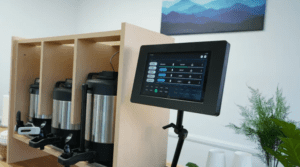 A couple of years ago, I mentioned that the robot uprising had reached the retail store. Well, now the uprising has reached your local coffee shop, and baristas everywhere should take notice. This week, Panera Bread announced that it would pilot Miso Robotics’ new automated coffee brewing system. Since its founding in 2016, Miso has crowdfunded more than $50 million, according to the company. It’s in the middle of its Series E round, which values the startup at $500 million. Miso’s latest launch is the CookRight Coffee system, which uses artificial intelligence to monitor coffee volume and temperature. It also provides predictive analytics that can tell the restaurant more about what kind of coffee its customers enjoy and when. Panera’s goal for the system is to give employees “more time to devote to other tasks, such as helping customers, and to make sure coffee drinkers enjoy every sip of their beverage.” This will be another interesting trend to watch. And now on to this week’s logistics news.
A couple of years ago, I mentioned that the robot uprising had reached the retail store. Well, now the uprising has reached your local coffee shop, and baristas everywhere should take notice. This week, Panera Bread announced that it would pilot Miso Robotics’ new automated coffee brewing system. Since its founding in 2016, Miso has crowdfunded more than $50 million, according to the company. It’s in the middle of its Series E round, which values the startup at $500 million. Miso’s latest launch is the CookRight Coffee system, which uses artificial intelligence to monitor coffee volume and temperature. It also provides predictive analytics that can tell the restaurant more about what kind of coffee its customers enjoy and when. Panera’s goal for the system is to give employees “more time to devote to other tasks, such as helping customers, and to make sure coffee drinkers enjoy every sip of their beverage.” This will be another interesting trend to watch. And now on to this week’s logistics news.
- Walmart in the news:
- Amazon adds 5% ‘fuel and inflation surcharge’ to seller fees
- UPS wants to ship packages in the metaverse
- Retailers take measures to contain baby formula shortages
- Vehicle inspections causing delays for trucks in Texas
- Busiest US port sees record volume ahead of high-stakes labor talks
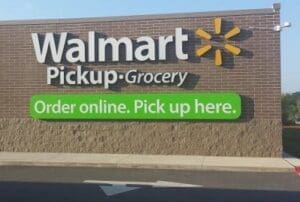 According to recent reports, Walmart has increased the number of digital orders coming from its stores by 170 percent in the last year. This has led the company to scale its automated market fulfillment centers, tap machine learning, and test autonomous delivery (more on this last point later). As a result, Walmart has been redesigning its technology to support this new supply chain model. The next phase of Walmart’s store integration and evolution is adding more market fulfillment centers to stores. Market fulfillment centers are a compact, modular warehouse built inside or added to a store, which, in addition to fresh and frozen items, can store thousands of other items. Walmart explains: “Instead of an associate walking the store to fulfill an order from our shelves, automated bots retrieve the items from within the fulfillment center. The items are then brought to a picking workstation, where the order can be assembled with speed.” Walmart began piloting its first market fulfillment center in Salem, NH in 2019 and recently announced it is planning dozens of locations, with many more to come. In some stores, it will also add automated pickup points.
According to recent reports, Walmart has increased the number of digital orders coming from its stores by 170 percent in the last year. This has led the company to scale its automated market fulfillment centers, tap machine learning, and test autonomous delivery (more on this last point later). As a result, Walmart has been redesigning its technology to support this new supply chain model. The next phase of Walmart’s store integration and evolution is adding more market fulfillment centers to stores. Market fulfillment centers are a compact, modular warehouse built inside or added to a store, which, in addition to fresh and frozen items, can store thousands of other items. Walmart explains: “Instead of an associate walking the store to fulfill an order from our shelves, automated bots retrieve the items from within the fulfillment center. The items are then brought to a picking workstation, where the order can be assembled with speed.” Walmart began piloting its first market fulfillment center in Salem, NH in 2019 and recently announced it is planning dozens of locations, with many more to come. In some stores, it will also add automated pickup points.
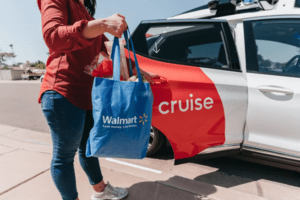 Cruise, the self-driving car unit of General Motors, has expanded its autonomous delivery pilot with Walmart in Arizona. The company will now be doing limited deliveries for customers in Chandler, in addition to Scottsdale. The expanded pilot will still have limited availability between the two stores. Cruise will offer delivery from Monday to Friday, 8 a.m. to 8 p.m., in a service area that Cruise says is set by customer demand and varies by location. The company did not share its operational design domains in each city, which it says is constantly evolving. Walmart customers are told that they’ll save money by opting to have their orders delivered by Cruise. To opt-in, they must place their Walmart order online and agree to receive SMS messages. If their order qualifies, they’ll receive a message from Cruise asking if they’d like to receive their parcel from one of Cruise’s vehicles.
Cruise, the self-driving car unit of General Motors, has expanded its autonomous delivery pilot with Walmart in Arizona. The company will now be doing limited deliveries for customers in Chandler, in addition to Scottsdale. The expanded pilot will still have limited availability between the two stores. Cruise will offer delivery from Monday to Friday, 8 a.m. to 8 p.m., in a service area that Cruise says is set by customer demand and varies by location. The company did not share its operational design domains in each city, which it says is constantly evolving. Walmart customers are told that they’ll save money by opting to have their orders delivered by Cruise. To opt-in, they must place their Walmart order online and agree to receive SMS messages. If their order qualifies, they’ll receive a message from Cruise asking if they’d like to receive their parcel from one of Cruise’s vehicles.
![]() Amazon is taking a step to offset its rising costs, announcing Wednesday it will add a 5 percent “fuel and inflation surcharge” to fees it charges third-party sellers who use the e-commerce giant’s fulfillment services. The Seattle-based company said on its website that the added fees, which take effect April 28, are “subject to change” and will apply to both apparel and non-apparel items. Amazon’s third-party marketplace, where independent merchants list millions of their products, is a huge part of its business. It has about 2 million sellers, and more than half the goods sold on Amazon.com come from these sellers. Though the company is blaming inflation and rising fuel costs for the surcharge, Stacy Mitchell, co-director for the anti-monopoly group Institute for Local Self-Reliance, criticized Wednesday’s announcement, saying Amazon was taking advantage of the moment.
Amazon is taking a step to offset its rising costs, announcing Wednesday it will add a 5 percent “fuel and inflation surcharge” to fees it charges third-party sellers who use the e-commerce giant’s fulfillment services. The Seattle-based company said on its website that the added fees, which take effect April 28, are “subject to change” and will apply to both apparel and non-apparel items. Amazon’s third-party marketplace, where independent merchants list millions of their products, is a huge part of its business. It has about 2 million sellers, and more than half the goods sold on Amazon.com come from these sellers. Though the company is blaming inflation and rising fuel costs for the surcharge, Stacy Mitchell, co-director for the anti-monopoly group Institute for Local Self-Reliance, criticized Wednesday’s announcement, saying Amazon was taking advantage of the moment.
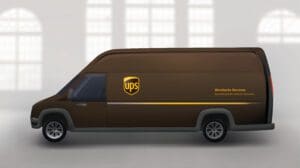 UPS is entering the metaverse. In case you don’t know what the metaverse is, here’s a quick explanation. The metaverse is a growing collection of interconnected virtual reality and digital platforms with online personas, real estate, and businesses. People can log in and interact, similar to a multiplayer video game. UPS has submitted several trademark filings to the US Patent and Trademark Office that indicate it plans to join the metaverse. The filings are for goods and services including “non-fungible tokens” (NFTs); “virtual goods, namely, packages, parcels, [and] shipping labels;” and “virtual retail shipping.” The company also may be considering virtual events. UPS filed to trademark “conducting virtual trade show exhibitions online in the field of small business enterprises.” I wonder if the metaverse expects same-day shipping.
UPS is entering the metaverse. In case you don’t know what the metaverse is, here’s a quick explanation. The metaverse is a growing collection of interconnected virtual reality and digital platforms with online personas, real estate, and businesses. People can log in and interact, similar to a multiplayer video game. UPS has submitted several trademark filings to the US Patent and Trademark Office that indicate it plans to join the metaverse. The filings are for goods and services including “non-fungible tokens” (NFTs); “virtual goods, namely, packages, parcels, [and] shipping labels;” and “virtual retail shipping.” The company also may be considering virtual events. UPS filed to trademark “conducting virtual trade show exhibitions online in the field of small business enterprises.” I wonder if the metaverse expects same-day shipping.
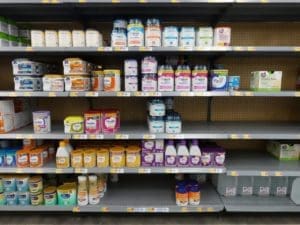 The supply of baby formula, a very important product for many new parents, is facing a shortage. According to reports, the supply is so constrained right now that retailers are limiting the number of products consumers are allowed to purchase in order to preserve their inventories. Walgreens, CVS, and Target have recently put limits on how many baby formula products consumers can purchase at one time. A spokesperson for Walgreens told CBS MoneyWatch it is limiting customers to three infant and toddler formula products per transaction, citing “increased demand and various supplier issues.” CVS Health also said it has imposed a limit of three baby formula products per purchase in stores and online, until it can procure sufficient supply from its vendors. And a spokesperson for Target confirmed it has product limitations in place. At Target.com, consumers can only purchase four pieces of a given baby formula product at a time.
The supply of baby formula, a very important product for many new parents, is facing a shortage. According to reports, the supply is so constrained right now that retailers are limiting the number of products consumers are allowed to purchase in order to preserve their inventories. Walgreens, CVS, and Target have recently put limits on how many baby formula products consumers can purchase at one time. A spokesperson for Walgreens told CBS MoneyWatch it is limiting customers to three infant and toddler formula products per transaction, citing “increased demand and various supplier issues.” CVS Health also said it has imposed a limit of three baby formula products per purchase in stores and online, until it can procure sufficient supply from its vendors. And a spokesperson for Target confirmed it has product limitations in place. At Target.com, consumers can only purchase four pieces of a given baby formula product at a time.
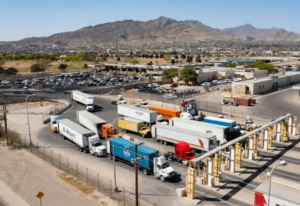 Commercial vehicles trying to enter the United States to deliver products from Mexico have been backed up for hours at Texas ports of entry following Governor Greg Abbott’s directive on Wednesday that state troopers increase inspections. Abbott’s order is part of his push to stiffen security at the state’s southern border as the Biden administration in Washington, DC, plans to end a pandemic-era emergency health order that had allowed federal officials to turn away migrants, even those seeking asylum. But officials in cities that depend on cross-border trade as economic engines fear negative impacts that the increased vehicle inspections could have. This week, US Customs and Border Protection showed five-hour delays for entry into Laredo through the Laredo-Colombia Solidarity International Bridge. The port of entry in Pharr had delays of more than four hours, and El Paso’s two inland ports had delays of three hours.
Commercial vehicles trying to enter the United States to deliver products from Mexico have been backed up for hours at Texas ports of entry following Governor Greg Abbott’s directive on Wednesday that state troopers increase inspections. Abbott’s order is part of his push to stiffen security at the state’s southern border as the Biden administration in Washington, DC, plans to end a pandemic-era emergency health order that had allowed federal officials to turn away migrants, even those seeking asylum. But officials in cities that depend on cross-border trade as economic engines fear negative impacts that the increased vehicle inspections could have. This week, US Customs and Border Protection showed five-hour delays for entry into Laredo through the Laredo-Colombia Solidarity International Bridge. The port of entry in Pharr had delays of more than four hours, and El Paso’s two inland ports had delays of three hours.
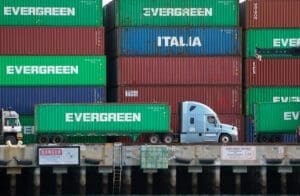 The Port of Los Angeles, the nation’s busiest, on Tuesday reported record first-quarter volume as anxiety builds ahead of the July 1 expiration of the labor contract covering some 22,000 West Coast dock workers. The Port of Los Angeles handles about 40 percent of US container cargo and is home to more union workers than any of the 29 Pacific Coast ports. An impasse in the West Coast talks threatens to undo progress at the Port of Los Angeles. Despite a continued flood of imports, workers there are whittling down pandemic-fueled cargo pileups that contributed to inventory shortages, helped drive up consumer prices, and turned the surrounding bay into a parking lot. The National Retail Federation (NRF) and other groups that depend on West Coast ports like Los Angeles are pressuring the dockworkers’ union and employers to quickly hammer out an agreement to avoid further injury to the world’s battered supply chains.
The Port of Los Angeles, the nation’s busiest, on Tuesday reported record first-quarter volume as anxiety builds ahead of the July 1 expiration of the labor contract covering some 22,000 West Coast dock workers. The Port of Los Angeles handles about 40 percent of US container cargo and is home to more union workers than any of the 29 Pacific Coast ports. An impasse in the West Coast talks threatens to undo progress at the Port of Los Angeles. Despite a continued flood of imports, workers there are whittling down pandemic-fueled cargo pileups that contributed to inventory shortages, helped drive up consumer prices, and turned the surrounding bay into a parking lot. The National Retail Federation (NRF) and other groups that depend on West Coast ports like Los Angeles are pressuring the dockworkers’ union and employers to quickly hammer out an agreement to avoid further injury to the world’s battered supply chains.
That’s all for this week. Enjoy the weekend, and the song of the week, the White Stripes cover of a Bob Dylan classic, One More Cup of Coffee.

















